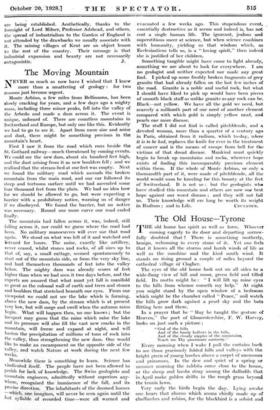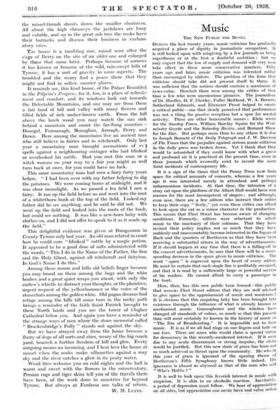The Old House—Tyrone
THE old house has spirit as well as form. Whoever coming eagerly to its door and departing sorrow- fully doubted that ? There is something motherly, benign, welcoming in every stone of it. Yet one feels that it knows all the storms and harsh winds of life as well as the sunshine and the kind south wind. It stands on rising ground a couple of miles beyond the cathedral village of Clogher.
The eyes of the old house look out on all sides to a wide-flung view of hill and moor, green field and tilled field. Its motto might be : " I will lift up mine eyes to the hills from whence cometh my help." At night you might stand by the open window of a bedroom which might be the chamber called " Peace," and watch the hills grow dark against a pearl sky and the bats flitting here and there.
In a prayer that he " May be taught the gesture of Heaven," the poet of Gloucestershire, F. W. Harvey, looks on just such a picture :
"God of the hills And of the lonely hollows in the hills, And of the cloudy nipples of the mountains,
Teach me Thy passionate austerity."
Every morning when I wake I pull the curtains back to see those graciously folded hills and valleys with the bright green of young larches above a carpet of anemones and primroses. In the dew and quiet of a spring or summer morning the rabbits come close to the house, or the sheep and lambs stray among the daffodils that in April make golden drifts in the rough grass beyond the tennis lawn.
Very early the birds begin the day. • Lying awake one hears that chorus which seems chiefly made up of chaffinches and robins, for the blackbird is a soloist and the missel-thrush shouts down the smaller choristers. All about the high chimneys the jackdaws are busy and voluble, and up in the great ash tree the rooks have their barracks and discuss their business in exclam- atory cries.
_ Tile house is a rambling one, raised soon after the siege of Derry on the site of an older one and enlarged by those that came later. Perhaps because of sorrows it has known or because of the wild, rain-swept hills of Tyrone, it has a sort of gravity in some aspects. - The troubled and the weary find a peace there that they might not find in softer, sunnier places.
It reminds me, this kind house, of the Palace Beautiful in the Pilgrim's Progress, for it, too, is a place of refresh- ment and comfort, and its windows look out towards the Delectable Mountains, and one may see from them a fair land of hill and valley with many flowers and tilled fields of rich umber-brown earth. From the hill above the larch wood you may watch the sun sink behind a mountain and count the far-flung counties— Donegal, Fermanagh, Monaghan, Armagh, Derry and Down. Here among the mountains live an ancient race who still believe in fairies and in witchcraft. Only last year a mountainy man brought accusations of evi spells against a neighbouring cottager who had blinked or overlooked his cattle. Had you met this man or a witch woman on your way to a fair you might as well turn back at once, for you could have no luck.
This same mountainy man had seen a fairy forty years before. " I had been over with my father helping to dig the potatoes. We were coming home at midnight, and it was clear moonlight. As we passed a lea field I saw a fairy. It ran up the field before us and went into the root of a whitethorn bush at the top of the field. I asked my father did he see anything, and he said he did not. We went up the field and looked into the roots of the bush, but could see nothing. It was like a new-born baby with clothes on, and I did not offer to speak to it as it made up the field."
- This delightful evidence was given at Dungannon in County Tyrone only last year. An old man related in court how he could cure " blinked " cattle by a magic potion. It appeared to be- a good dose of salts administered with the words, " This I do in the Name of the Father, the Son and the Holy Ghost, against all witchcraft and fairyism. In God's Name I do this."
- Among these moors and hills old beliefs linger because you may brood on them among the bogs and the whin bushes and a great quiet wraps you about, with only the curlew's whistle to distract your thoughts, or the plaintive, urgent request of the yellowhammer or the voice of the stonechats among the golden whin. Old pagan dreams find refuge among the hills till some turn in the rocky path brings a reminder of the faith Saint Patrick brought to these North lands and you see the tower of Clogher Cathedral below you. And again you have a reminder of the strange ways of men where the stone memorial called " Brackenbridge's Folly " stands out against the sky.
But we have strayed away from the house because a flurry of dogs of all sorts and sizes, weary of the big coach yard; beseech a further freedom of hill and glen. Every outgoing means an incoming, and I best love the house at sunset when the rooks make silhouettes against a rosy sky and the river catches a glow in its peaty water.
Wood fires welcome you on cold nights and the hall is warm and sweet with the flowers in the conservatory. Persian rugs and tiger skins tell you of the travels there have been, of the work done in countries far beyond Tyrone. But- always at Fardross one talks of return. W. M. LETTS.































































 Previous page
Previous page